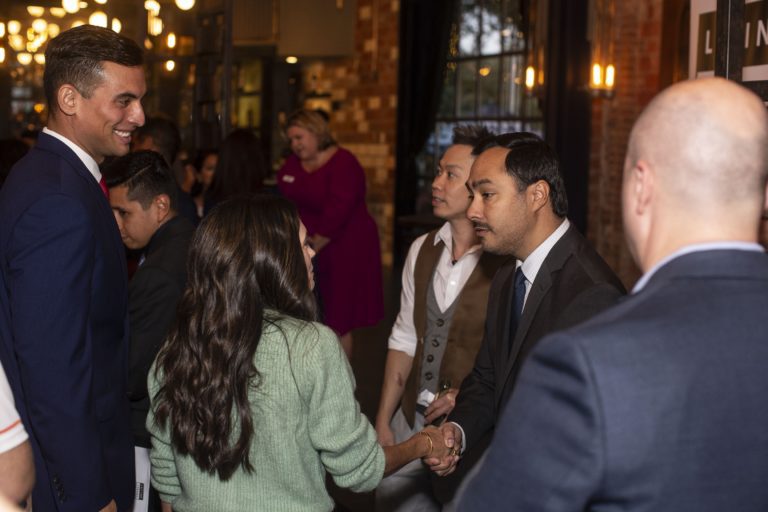The idea of networking has always made me cringe. I’ve always known it was a “skill” people needed to have to be successful and I felt certain I didn’t have it. I knew I was an introvert and figured networking wasn’t for me. I wasn’t like my friend Amir who could meet somebody at a bar one weekend and get invited to be a groomsman in their wedding a year later (true story). Over time, I’ve found ways to make it work for me; ways that are more authentic to my personality and style. I’ve had to address my mindset around networking while also working on tangible skills to help me while interacting with others. Today’s post will focus on tackling your mindset around networking, while the next post will provide you with more tangible networking skills. While networking is a term that encompasses more than “networking events,” that will make up the bulk of my references.
Tackling Your Mindset Around Networking
As with most things in life, if you go into something expecting it to go bad, then it will probably go bad. Think back to the emotions you may have felt as a kid entering a new grade level, school, or sports team. It didn’t matter how prepared I thought I was, I consistently felt nervous before and during the first day of school. Every year though, I told myself, “I was able to get through it the year before, so I can get through it this year too.” I believed in my ability to adapt to my new environment. If I didn’t think that way, I would have had miserable first days of school year after year. If you don’t address your mindset, each networking event you go to will be just as bad as you anticipated. Here are some alternative perspectives for you to consider as you work to change your mindset around networking.
Alternative Perspectives
-
- Defining “Networking” – When you network, you are building up your personal database of relationships. As with any relationship, there are give and take opportunities that might come up. If you give or take too much, the relationship is likely to suffer. It’s important to note that every interaction with another individual is an opportunity to establish a new relationship or strengthen a current one. Technically, when you’re hanging out with friends, you’re fortifying your network by strengthening those bonds between you. A few weeks ago, I found out a friend of mine, whom I hadn’t seen in years, was going to be in NJ while I was there during winter break. I reached out to grab lunch and we had a great time. I ended up talking to him about potential career shifts, and several weeks later, I got an email with links to jobs he found for me. This was a great reminder that EVERYBODY you know should be considered part of your network. Don’t take anybody for granted.
- Relationship Snowball – Like the snowball effect, one new relationship can expand into many more. As you continue to attend different events, you’ll start seeing some of the same individuals again. The more interactions you have with each person, the stronger your connection to them. Then, they’ll start introducing you to people they know, and your network will only continue to expand. I joined the Latino Texas PAC a few years ago and started attending Latino specific political events soon after. The first few events felt weird because I could count on one hand the people I knew. It didn’t take long for that to change, as I started to recognize the same people attending many of these events. Formal greetings turned into hugs and laughs. They became my ambassadors at future events, introducing me to all of their friends and connections.
- It’s About the Relationships – Networking can be hard if you go into it thinking about what you can get from other people. At the root of everything, it’s about establishing authentic relationships with others. People appreciate real connections and those happen when you demonstrate genuine interest in the other person. If the interaction feels more transactional than real, investment in the relationship will probably be weak. Don’t worry about meeting everybody in the room when you get to an event; that’s an unrealistic goal. If you end up at a networking event with 100 people in attendance, set a goal to make just one strong connection with somebody in the room. It doesn’t necessarily mean you spent the entire time talking to that person; it may have been 10 minutes. What matters is the connection established between the two of you, and that is based on the depth of the conversation. The same way you shouldn’t be focused on how many people you meet, you shouldn’t measure your interaction by how long your conversation went. You can leave an impact by fully engaging with the other individual and letting them know you care about getting to know them as a person.
- The Long Game – Oftentimes, the interactions you have at a networking event give you the chance to plant seeds in the minds of others that may or may not blossom. I’ve had people reach out to me with an opportunity for collaboration over a year after talking to them. Neither one of us had any idea that this was coming down the line, but we were ready. A few years ago, I went to an event that a friend invited me to. It was the grand opening of a new organization and there were only a few people there that didn’t work for that organization. I started to talk to a few individuals and learned about an amazing nonprofit that they worked for. I left when the event was over and didn’t think much else of the interaction. Over a year later, I get word that this nonprofit wanted to partner with my school and provide us with over $50,000 worth of resources. I didn’t go into the original conversation with any intention of getting anything at all from the person I was talking to, and didn’t leave it with any idea that something was coming way. Safe to say, I was happily surprised more than a year later!
As the saying goes, “It’s not always what you know, it’s who you know.” When I used to hear this saying, I got frustrated at the fact that my work ethic, talent, and potential weren’t enough. It bothered me to think I had to “sell” myself in order to better position myself for further opportunities. Over time, my opinion has completely changed as I started to see my network as a group of people who care about my well-being and want to see me do better. The relationships I’ve forged over time have been authentic, and so, when those in my network have connections to help me or when I reach out to support, the response is genuine. People care about people, so remember that there are plenty of people out there who’ll gladly look out for you if only they knew you.



